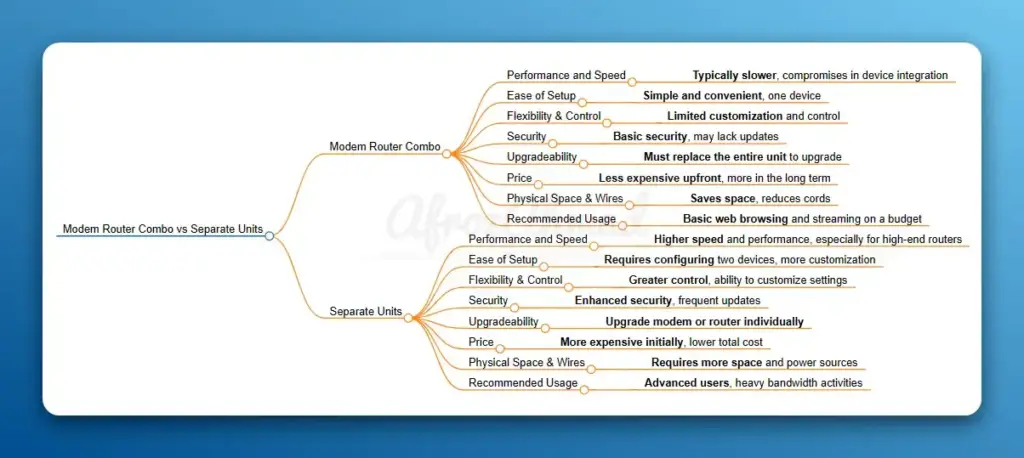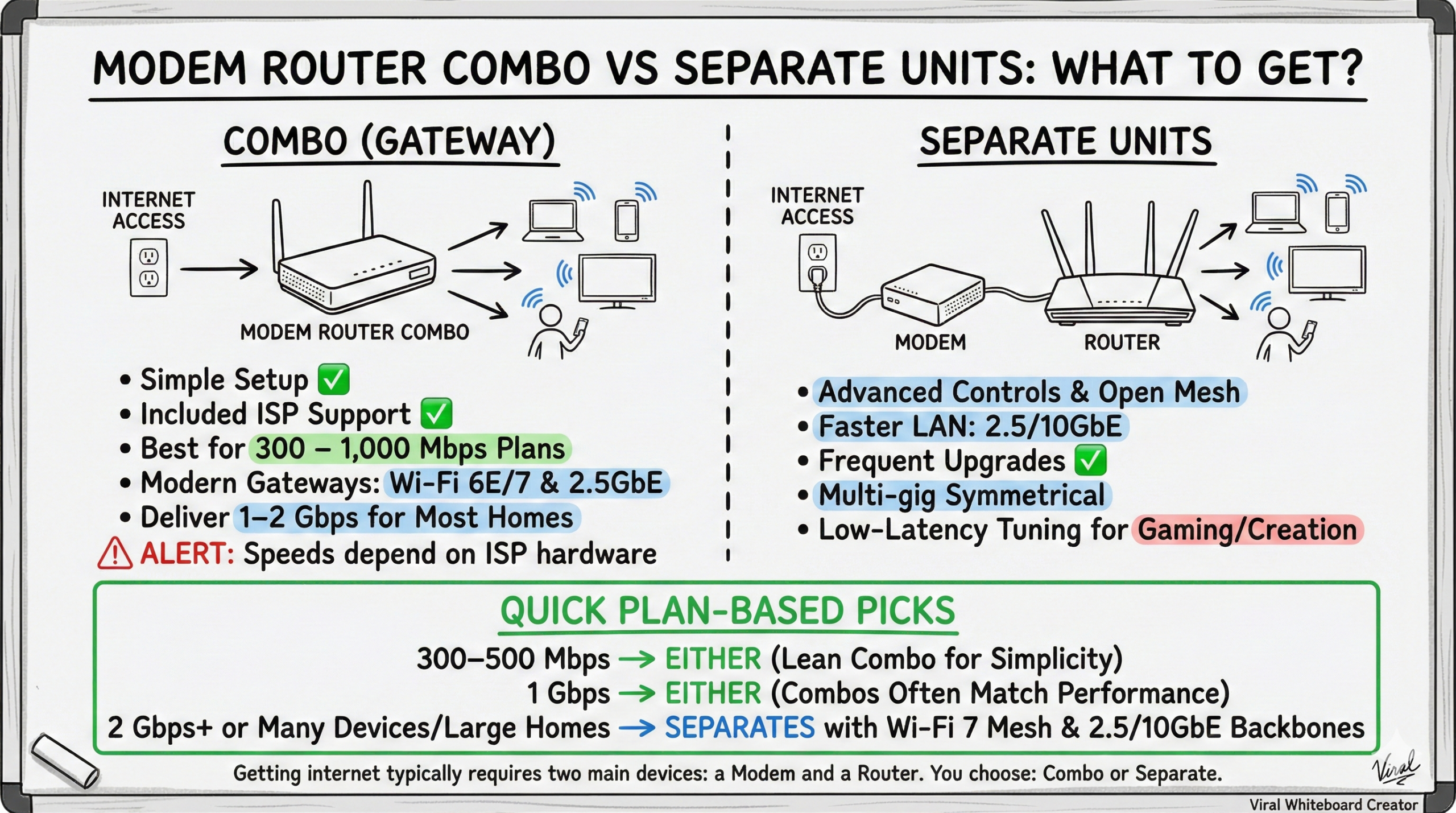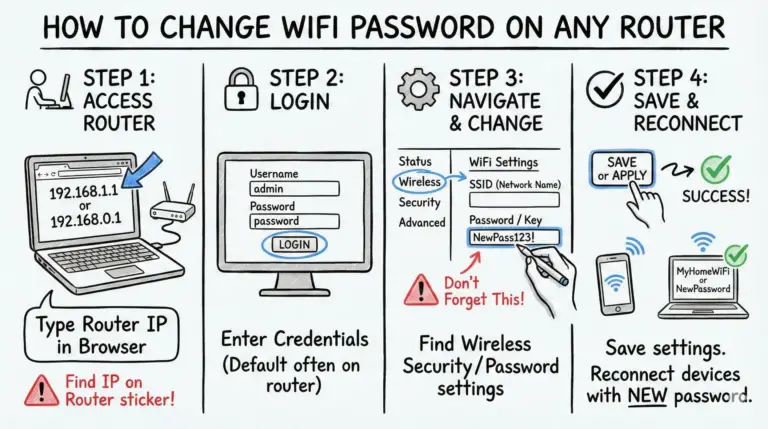TL;DR — Which should you get? – Pick a modem‑router combo (gateway) if you want simple setup, included ISP support, and your plan is in the 300–1,000 Mbps range. Modern ISP gateways with Wi‑Fi 6E/7 and 2.5GbE can fully deliver 1–2 Gbps for most homes.
Pick separate modem + router if you need advanced controls, open mesh, or faster LAN (2.5/10GbE), you plan to upgrade internet tiers frequently, or you’re chasing multi‑gig symmetrical and low‑latency tuning for gaming/creation.
Quick plan‑based picks: 300–500 Mbps → either (lean combo for simplicity). 1 Gbps → either (combos often match performance). 2 Gbps+ or many devices/large homes → separates with Wi‑Fi 7 mesh and 2.5/10GbE backbones.
Getting internet access at home typically requires two main devices – a modem and a router. The modem connects your home to the internet, while the router shares that connection among your devices. You have two options for setting up your home network:
- Use a modem router combo device (also called a gateway)
- Use a separate standalone modem and a router
Deciding between modem router combo vs. separate units can be confusing. This comprehensive guide breaks down the key differences, pros and cons, and things to consider when choosing between these two. By the end, you’ll have the knowledge to determine which setup is right for your needs.

Modem Router Combo vs Separate Units – Comparison Table
| Feature | Single Device – One Modem Router Combo | Two Devices – A Separate Modem and a Router |
|---|---|---|
| Performance and Speed | Comparable to separates for 300 Mbps–2 Gbps plans on modern Wi‑Fi 6E/7 gateways with 2.5GbE. | Leads for advanced setups, open mesh, 10GbE LAN, or tuned low‑latency. |
| Ease of Setup | Simple and convenient, everything in one device. | Requires configuring two devices; more steps but more control. |
| Flexibility & Control | Moderate controls; some ISP apps add prioritization/parental tools. | Maximum control: firmware choice, advanced QoS, VLANs, open mesh. |
| Security | Automatic updates and bundled protections common on ISP gateways. | Advanced options available; updates may be manual—user managed. |
| Upgradeability | Whole‑unit swap; many ISPs now swap gateways with tier changes. | Modular: upgrade modem or router separately as needs evolve. |
| Price | Often included in certain plans; some ISPs charge a monthly Wi‑Fi fee. | Higher upfront, lower long‑term if you keep gear across ISP plans. |
| Physical Space & Wires | Minimal—one box, fewer cables. | More space and power outlets for two devices. |
| Recommended Usage | General homes up to 1–2 Gbps, simple management, ISP support. | Power users, multi‑gig LAN, large homes, creators/gamers. |
| ISP Support | Typically includes install/help; app‑based controls. | More self‑managed; full control if you like to tinker. |
What is a Modem, Router, and Modem Router Combo?
Before diving into the comparisons, let’s clearly define what these devices are and what they do:
What is a Modem?
A modem is the device that connects your home to the internet. It takes the signal from your internet service provider (ISP) like Comcast Xfinity, Spectrum, etc. and converts it into a usable internet connection.
Most modern internet connections are delivered via cable or fiber. Fiber deployments typically terminate at an ONT (optical network terminal), which serves the role of the modem—your router or gateway connects to the ONT. Legacy DSL exists in some areas but is shrinking as providers transition to newer technologies.
What is a Router?
A router takes the internet connection from your modem and shares or “routes” it to multiple devices in your home so they can access the internet. Routers allow both wired and wireless connections.
Key features of routers include:
- Create a wireless network with WiFi
- Allow many devices to connect to one modem
- Enable connected devices to communicate with each other
- Provide network security
What is a Modem Router Combo (Gateway)?
A modem router combo, also called a gateway, combines the functions of both a modem and router into a single device. It connects to the ISP to get internet access and has wired and wireless router capabilities built-in to share the connection in your home.
Using one consolidated device can save space and cords compared to separate units. They are also typically easier to set up as everything is self-contained in one box.
Now that you know what these devices are, let’s explore the key differences between modem router combos and separate modems/routers.
See also: Modem vs Router
Wi‑Fi 7 and Multi‑Gig in 2026
Wi‑Fi 7 (802.11be) routers and some ISP/retail gateways are now widely available. Benefits you’ll notice include higher peak throughput with 320 MHz channels, better reliability in congested homes, and Multi‑Link Operation (MLO) that can lower latency by using multiple bands at once. If you run many devices, game, or move large files, Wi‑Fi 7 gear—combo or separate—can be worth it.
Multi‑gig LAN: Look for at least one 2.5GbE port on gateways/routers to fully utilize 1–2 Gbps plans; creators and enthusiasts may want 10GbE for fast NAS/backups. Many premium gateways now include 2.5GbE; separates give you broader 2.5/10GbE choices.
Modem Router Combo vs Separate – 7 Key Differences
Performance and Speed
In general, separate modem and router devices still offer the most headroom, especially for 10GbE LANs, advanced QoS, and flexible mesh. However, modern ISP gateways with Wi‑Fi 6E/7 radios and 2.5GbE ports can match standalone routers on 300 Mbps to 2 Gbps plans. For multi‑gig LAN workflows or custom tuning, separates retain the edge.
Here’s why:
- Premium standalone routers compete on raw speed, range, and features and can be paired with open mesh systems.
- Today’s gateways are far more capable than older models, often supporting Wi‑Fi 6E/7 and multi‑gig Ethernet—good enough for most 1–2 Gbps plans.
If you only have a 100–500 Mbps plan, either setup will deliver full speed. For multi‑gig internet or large home coverage, a high‑end separate router with Wi‑Fi 7 mesh still provides the most flexibility.
Ease of Setup
Modem router combos are extremely simple to set up since everything is self-contained in one box. You just need to connect to your ISP and configure it once.
Whereas purchasing a separate modem and router requires installing and configuring two different pieces of hardware, which can be more complex. Doing it yourself requires some tech know-how.
So combos win for simplicity and convenience during initial setup. But for more tech-savvy users, a separate setup offers more customization.
Flexibility in Features and Controls
All-in-one gateways offer less control and ability to customize settings compared to separate devices. You get what comes built-into that single box.
Advanced standalone routers provide many more ways to optimize and tailor connectivity for your needs. This includes things like:
- Quality of Service (QoS) and device/app prioritization
- Parental controls
- Guest networks
- VPN support
- MU-MIMO, beamforming, and Wi‑Fi 7 features like MLO
- Mesh WiFi support (open, multi‑vendor options)
Note: many ISP gateways now support their own mesh extenders; they’re easy but typically vendor‑locked compared to open mesh kits.
So in terms of controlling and customizing your network, separate routers are far superior.
Security
Better security often comes with those extra router features and controls mentioned above. Things like guest networks, VPN, filtering, and parental controls. Plus, avoiding the generic admin password that combos come with by default.
Many ISP gateways now receive automatic security updates and bundle network protections via the ISP app. Retail routers vary—some update automatically, others need manual updates. Whichever route you choose, keep firmware current and use strong, unique passwords.
So while all-in-one devices include basic wireless encryption, advanced security benefits lean towards a separate router.
Upgradeability
If you purchase your equipment, upgrading or replacing devices is easier with separate modem and router units.
You can swap out just the modem or just the router if something stops working or you want better performance. Whereas if you owned a modem router combo unit, upgrading means replacing everything at once.
Renting combos from an ISP often comes with free replacement if something breaks, and many providers now swap gateways when you change speeds/tiers, which can be convenient.
So for more flexibility in upgrading specific elements of your network gear, go for standalone.
Price
In most cases, purchasing an all-in-one modem router combo unit costs less upfront than buying a separate modem and router.
Plan inclusions matter: Some ISPs now include a gateway and unlimited data with long price‑guarantee plans, while others add a monthly Wi‑Fi fee on certain tiers. Always check your plan details—what’s included, what’s optional, and any equipment swap policies—before deciding to buy or rent.
If you expect to keep the same router for several years and perhaps switch providers, owning separates can pay off over time, especially if you want Wi‑Fi 7 mesh or 10GbE.
Physical Space and Wires
An advantage of modem router combos is consolidating everything into one compact box. This saves physical space and cuts down cords/cable clutter since it only needs one power connector.
Whereas having standalone modem and router means finding room for two devices and each needs its own power source. So combo wins if you have limited area to place networking hardware.
Pros and Cons Comparison (Modem Router Combo vs Separate Devices)
To summarize the key benefits and downsides:
Modem Router Combo Pros:
Modem Router Combo Cons:
Separate Modem and Router Pros:
Separate Modem and Router Cons:
Usage Scenarios and Recommendations
The right choice comes down to your specific needs and technical ability. Here are some guidelines based on common usage cases:
For basic web browsing and streaming on a budget → Modem Router Combo
If your home usage is basic – just surfing, social media, streaming video etc. – and you want a simple, affordable option, a modem router combo is probably sufficient. The performance is enough for lighter demands. Go for a combo if you value ease and price.
For advanced users and heavy bandwidth activities → Separate
Do you have gigabit or higher internet speeds? Are there lots of connected devices in your household? For power users, gamers, smart home techies…you’ll benefit from a high-end router over what a combo can provide. The same applies if you prioritize features like QoS, VPNs, and customization. Spend more upfront for a separate setup to get the most out of your connection.
If you value ISP support → Modem Router Combo
Combos leased from your provider usually come with installation and technical assistance from the ISP if issues arise. If you want that level of included support, renting a 2-in-1 gateway may give you peace of mind. Know that ISP devices tend to be locked down in terms of open access to settings.
Common setups (bridge mode, mesh, wiring)
- Bridge mode: Use your ISP gateway as a modem only and connect your own router for advanced features. Look in the ISP app/web portal for “bridge” or “passthrough.”
- Gateway + mesh: Add your ISP’s mesh extenders for easy whole‑home coverage, or disable the gateway Wi‑Fi and run an open Wi‑Fi 7 mesh kit from your own router.
- Wired backhaul: For multi‑story homes, run Ethernet between mesh nodes. Prefer 2.5GbE or better on nodes if you use 1–2 Gbps internet.
- Link aggregation: On supported routers/NAS, use 2×1GbE LAG or native 2.5/10GbE for faster local file transfers.
Cable in 2026: DOCSIS 4.0 snapshot
Large cable providers are rolling out DOCSIS 4.0 upgrades that enable multi‑gig and in many areas symmetrical speeds over existing coax. Retail hardware is evolving, and ISPs may provide compatible gateways as tiers upgrade. If you’re on cable and eyeing multi‑gig, verify your market’s DOCSIS version and gateway options before buying your own modem.
Fiber reality check: ONT vs. modem
On fiber, the provider installs an ONT that converts fiber to Ethernet; you don’t bring a separate modem. You connect your router or gateway directly to the ONT. If you switch to fiber from cable/DSL, plan on using the ONT plus a compatible router/gateway.
Conclusion
Getting both modem functionality to connect with your ISP plus router capabilities to share that connection can be achieved with either an all-in-one modem router combo or standalone separate devices.
Combo gateways simplify setup and can now deliver excellent performance—even up to 1–2 Gbps—while including app‑based controls and automatic security updates. For the best optimization options, multi‑gig LAN, and long‑term flexibility, purchasing your own modem and router remains the way to go for advanced users.
Consider your home’s needs. If budget constrained or usage is pretty basic, don’t overlook the conveniences of modem router combos. But to extract maximum WiFi performance and customization, standalones win out.
Weigh your specific requirements of price, usage, technical ability and more. And apply the comparisons and recommendations in this guide to choose the right modem and router approach for your home.
FAQs
Here are answers to some frequently asked questions about modem router combos vs a separate setup:
Should I get a modem router combo or separate devices?
For most home users focused on affordability and simplicity, an all-in-one modem router combo works great. If you have advanced needs or care most about speeds and performance, go for standalone modem and router.
Is a separate router and modem better for gaming?
Generally yes for advanced gamers—standalone routers offer deeper QoS controls and 10GbE options. That said, some modern gateways include app‑managed prioritization and Wi‑Fi 7’s MLO can reduce latency. Choose based on how much control you need.
Can I use two routers with one modem?
You can connect two (or more) routers to a single modem in what’s called a cascaded router setup. This allows you to expand your network coverage for example. But it takes some configuration know-how to avoid conflicts between the routers.
Does a modem increase WiFi speeds?
Not directly. Modems (or fiber ONTs) dictate your overall internet bandwidth from the ISP. Routers then distribute and share that bandwidth over the local WiFi network. Upgrading an older modem/ONT or router can help your network reach the speeds your plan allows.
Do I need a modem with fiber (ONT)?
No. The ONT is the modem equivalent on fiber. You connect your router or gateway directly to the ONT’s Ethernet port.
Is Wi‑Fi 7 worth it on a 500 Mbps plan?
It can be, if you have many devices or want lower latency and better reliability. Otherwise, Wi‑Fi 6/6E is often sufficient below 1 Gbps. For 1–2 Gbps plans or heavy creation/gaming, Wi‑Fi 7 is a strong pick.
Can I use bridge mode with my gateway?
Usually yes. Most ISP gateways support bridge or passthrough mode so you can use your own router for advanced features and mesh. Check your ISP app or support docs for the exact steps.
- Telecom Network Infrastructure: Complete Guide to Components & Design - January 6, 2026
- TP-Link TL-SG108E vs Netgear GS308E: Budget Smart Switches - January 5, 2026
- MikroTik CRS305-1G-4S+ Review: The Ultimate Budget SFP+ Switch Guide - December 25, 2025



